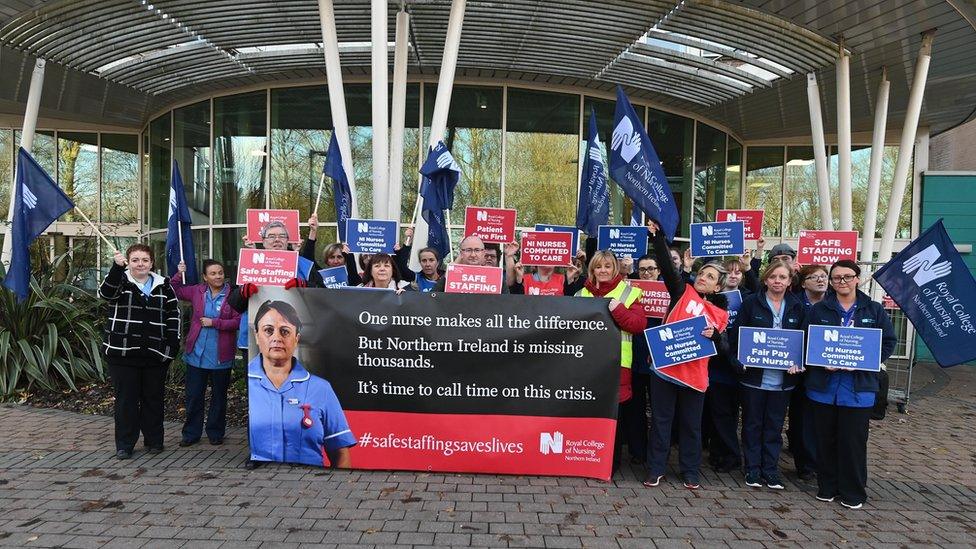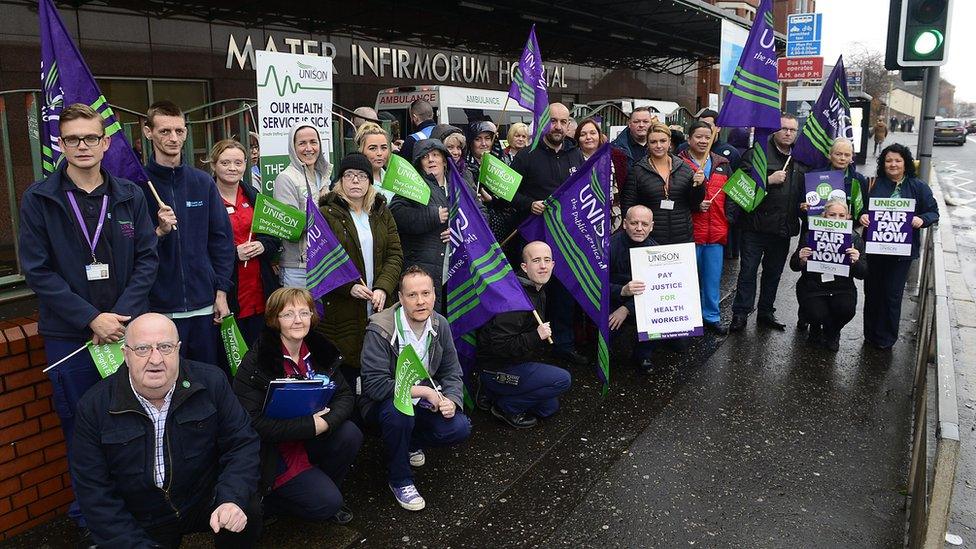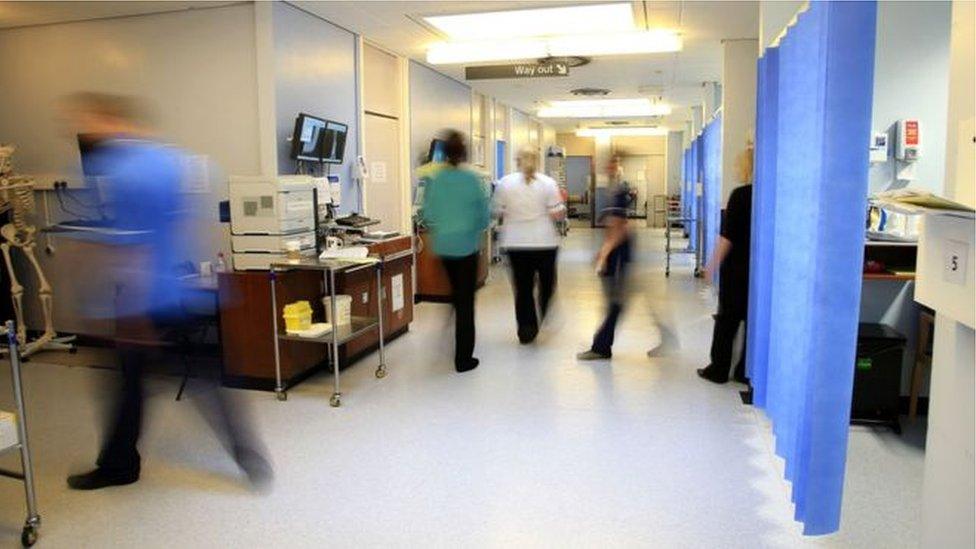Nurses' strike NI: Why are Northern Ireland's nurses going on strike?
- Published

It is the first time members of the Royal College of Nursing in NI have voted for strike action
Health workers across Northern Ireland have been staging industrial action in protest against pay and staffing levels which they say are "unsafe".
Last month, for the first time in UK history, the Royal College of Nursing (RCN) voted to on strike across Northern Ireland with members of the largest health union Unison following suit days later.
It is believed that about 15,500 nurses in total are taking part in a walk-out on Wednesday - that figure includes about 9,000 RCN nurses and a further 6,500 Unison nurses.
RCN nurses are staging a 12-hour strike which began at 08:00 GMT on Wednesday.
Other unions including Unite and the Northern Ireland Public Service Alliance (Nipsa) are also joining the industrial action, with paramedics staging a 24-hour strike.
BBC News NI explains the background to the crisis.
What are the origins of the dispute?
The problem of pay and funding for nurses and healthcare staff dates back to about 2010.
Until January 2017, it was the responsibility of a health minister in the devolved Stormont executive to decide on pay for healthcare staff in Northern Ireland.
But then devolution collapsed, following a bitter row between power-sharing partners Sinn Féin and the Democratic Unionist Party (DUP), because of a green energy financial scandal.
Since then, the top civil servant in the Department of Health, Richard Pengelly, has been in charge.
Why does Northern Ireland differ from Great Britain on the issue?
Nurses in Northern Ireland have their training fees and bursaries paid for, while those in England do not.
Five Stormont health ministers - from 2010 until the collapse of devolution - were at the helm regarding pay issues for health care workers:
Michael McGimpsey - Ulster Unionist Party
Edwin Poots, Jim Wells and Simon Hamilton of the DUP
Michelle O'Neill - Sinn Féin
While changes to policy were in the hands of ministers, decisions about saving money were rubber-stamped by the Stormont executive, which up until 2016 included ministers from all five main parties.
In late 2014, then-Health Minister Jim Wells said he would impose a "degree of restraint", external on pay for health care workers, due to financial challenges in the department.
A differential developed between Northern Ireland and the rest of the UK, where pay rises for nurses and healthcare workers in Northern Ireland did not increase in line with those in Scotland, England and Wales.

Some health workers began their first phase of industrial action on 25 November
Have there been subsequent pay awards for Northern Ireland's healthcare workers?
Yes, but those have not been without criticism either.
In January 2016, then-Health Minister Simon Hamilton announced a 1% pay award that almost triggered industrial action.
At the time, the unions said the 1% rise was a one-off payment for most staff rather than an increase in annual salaries, which had been the case in other parts of the UK.
Mr Hamilton argued that the demands from the unions were "unaffordable".
In August 2016, Sinn Féin's Michelle O'Neill, who had taken over the health minister brief by then, wrote to the NHS Pay Review Body, external, as part of its annual remit, saying the arrangements on pay would remain unchanged.
In her letter, she said the Northern Ireland Executive had "endorsed the principle of adherence to the UK government's public sector pay policy and, therefore, any proposals will be constrained by HM Treasury's call for future pay restraint".
In 2017, the Westminster government agreed a pay deal that guaranteed an increase over three years for NHS workers.
But the deal was not implemented in Northern Ireland due to the lack of a functioning executive.

Some health workers began their first phase of industrial action on 25 November
What has happened since then?
Since the Northern Ireland Assembly collapsed in 2017, talks have been ongoing between the health unions and the Department of Health.
To date, little has been agreed, which has led to nurses and members of Northern Ireland's largest health union, Unison, voting for strike action.
The Department of Health has said it remains "focused on finding a way forward" and is finalising a formal pay offer for 2019-20, which would be "the best offer possible within the budget available" given intense budgetary pressures.
When is the action taking place?
Some health workers began their first phase of industrial action on 25 November.
It has included the withdrawal of labour at different times, across a number of hospitals in Northern Ireland, such as:
Not working overtime on days of industrial action
Not working unpaid hours
Not completing paperwork other than individual patient records
Unions have said they are receiving strong public support and the Stormont civil service said intensive contingency planning is being undertaken to mitigate the impact of industrial action on patients and other service users.
On Tuesday, the five main political party leaders wrote to the Northern Ireland secretary calling on him to restore the parity between nurses pay.
They later met two senior civil servants, but there was no breakthough.
Ahead of Wednesday's strike, a spokesperson for Health and Social Care Board (HSCB) said major challenges were expected across all health and social care services.
It advised that if patients or service users have not been contacted by their Trust then they should attend their appointment/ service as normal.
All emergency departments remain open, but "significant pressure" was expected within the departments.
"The priority will be on the treating emergency and life threatening conditions first. Patients with less urgent conditions may have to wait for lengthy periods," said the spokesperson.
- Published2 December 2019
